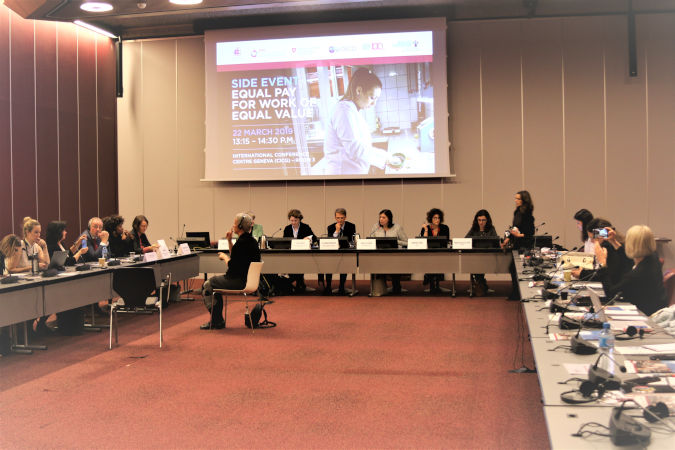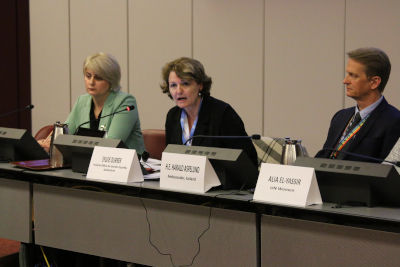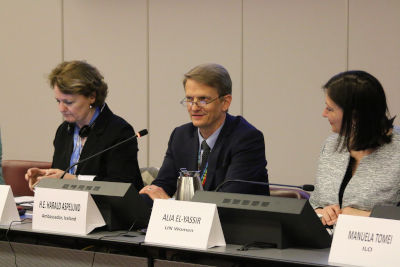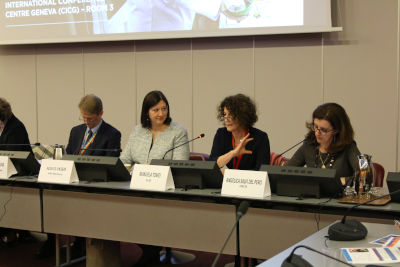International community calls for equal pay for work of equal value at high-level Regional Forum
Date:

At the Regional Forum on Sustainable Development for the United Nations Economic Commission for Europe (UNECE) Region in Geneva, high-level government representatives, trade unions, civil society and the international community discussed the issue of equal pay for the work of equal value, shared knowledge and exchanged good practices on how to accelerate the achievement of equal pay. They called for urgent action to ensure equal pay for work of equal value by adopting the right policies and requiring companies to implement transparent pay measures.
Building upon the momentum gained since the launch of the Equal Pay International Coalition (EPIC) in September 2017, the Permanent Mission of Switzerland to the World Trade Organisation (WTO) and the European Free Trade Association (EFTA) and the Permanent Mission of Iceland, in partnership with the EPIC Secretariat, OECD, ILO and UN Women Regional Office for Europe and Central Asia, launched EPIC in the Europe and Central Asia region.

“The next generation shouldn’t fight the equal pay battle. It is our responsibility to solve this issue,” urged Sylvie Durrer, the Director of the Federal Office for Gender Equality of Switzerland and Chair of the EPIC Steering Committee.
At the Side Event on 22 March, the participants identified unpaid care work, strong occupational segregation, underrepresentation of women in senior leadership positions, gender stereotypes and social norms, and the gender gaps in social protection and pensions as some of the common challenges inhibiting the achievement of equal pay in the region and globally.

H.E. Harald Aspelund, the Ambassador and Permanent Representative of Iceland to the International Organizations in Geneva, highlighted the importance of paid parental leave for fathers and shared his own personal experience. “I was among the first fathers in Iceland to use paternity leave. It was the happiest period of my life,” he said.
“The focus to ensure equal pay for work of equal value is important as we strive to achieve the Sustainable Development Goals by 2030 and its commitment to ‘leaving no one behind’. The ‘quarter of a century’ review of Beijing Platform for Action implementation [Beijing+25] provides us with a good momentum to call together all UN Member States to agree and jointly implement a clear roadmap for turning gender equality into action and specifically to ensure equal pay for work of equal value,” said Alia El-Yassir, UN Women Regional Director for Europe and Central Asia, co-moderating the Side Event.

“In the region, women are more educated than men, but we found that within the same occupations, women earn lower wages. Women who have children earn considerably less than man with children. There is clear undervaluation of work performed by women, coupled with conscious and unconscious biases,” warned Manuela Tomei, Director of the ILO’s WorkQuality Department, co-moderating the event.
Angelica Salvi del Pero, the Senior Advisor to the Director of Employment, Labour and Social Affairs at OECD emphasized the criticality of paternity leave for ensuring equal pay. She said, “Polices should encourage equal sharing of parental leave and childcare. Paid paternity leave needs to be a real option for fathers. We need to change the expectations about fathers’ engagement in parenting.”
At the event, UNECE declared its commitment to join EPIC and implement equal pay policies. Malinka Koparanova, Senior Social Affairs Officer and Gender Focal Point of UNECE, underlined the importance of effective research and statistics to help identify the factors that contribute to pay gap in the countries of the region.
The government of Georgia was represented by Tamila Barkalaia, the Deputy Minister of Internally Displaced Persons from Occupied Territories, Labor, Health and Social Affairs, who spoke about her government’s measures to accelerate women’s economic empowerment. “Without joint efforts and tripartite dialogue, it is impossible for the Government to develop regulations and ensure their implementation. We can’t talk about equal pay and remuneration without political will. It is in place in Georgia,” assured the Deputy Minister.
Ms. Durrer wrapped up the Side Event by calling for urgent actions to increase women’s economic empowerment, specifically:
- Implement equal pay
- Introduce maternity and paternity leave policies
- Promote inclusive work arrangements
- Combat gender stereotypes
- Ensure high level education for all
Henrike von Platen, the CEO of Fair Pay Innovation Lab and a member of EPIC; Chidi King, the Director of Equality at International Trade Union Confederation and Ton Shoenmaeckers, representing the International Organisation of Employers (IOE) were among the other participants who shared their experience in furthering the work to ensure equal pay as members of EPIC.